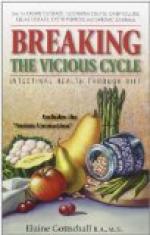Calories per oz.
Fats 255
Nuts, edible part 200
Sugar 115
Cream cheese 110
Cottage cheese (no fat) 30
Breads 75
Lean meats 50
Lean fish 35
Eggs (per oz.) 40
Milk, whole 20
Milk, skim and buttermilk
(no fat) 10
Milk, condensed, sweet 100
Milk, condensed, unsweet. 50
Cream, thin 60
Cream, thick 110
Fruits: Dried 100
Sweet 25
Acid 15
Vegetables: Potatoes,
plain (oz.) 30
Cooked Legumes, (peas,
beans, etc.) 20-35
Watery and leafy 5-15
5
Vegetarianism vs. Meat Eating
[Sidenote: Protein]
As protein is the only food which builds and repairs tissue, it is the food which has caused the most controversy.
First: As to the amount needed.
Second: As to whether animal flesh protein is necessary.
[Sidenote: Chittenden]
AMOUNT NEEDED: It was thought for many years that 150 grams or 5 ounces of dry protein (equivalent to about 1-1/2 pounds lean meat) per day was necessary. But experiments of Chittenden and others have proved that considerably less is sufficient, and that the health is improved if less is taken.
Chittenden’s standard is 50 grams, or 1-2/3 ounces, dry protein (equivalent to 1/2 pound meat per day). This is considered by many as insufficient. A variation from 1-2/3 to 3 ounces dry protein per day will give a safe range. (ROSE.)
[Sidenote: Approx. 240 to 360 C Per Day]
The amount of protein needed is comparatively independent of the amount of physical exertion, thus differing from the purely fuel foods, carbohydrates and fats, which should vary in direct proportion to the amount of physical exertion. In general, 10 to 15 per cent of the total calories per day should be taken as protein. An excess is undoubtedly irritant to the kidneys, blood vessels, and other organs, and if too little is taken the body tissues will suffer.
Not all of the protein should be taken in the form of animal protein; at least one-half should be taken from the vegetable kingdom.
Animal Flesh Protein
[Sidenote: Necessary?]
The following are a few of the chief reasons given by those who object to its use:
[Sidenote: The Negative Side]
First: The animal has just as much right to life, liberty, and pursuit of happiness as we have.
Second: They may be diseased, and there is the possibility of their containing animal parasites, such as tapeworms and trichinae. I would like to tell you more about worms, they are so interesting, but He says not to try to tell all I know in this little book; that maybe he will let me write another sometime, although it is a terrible strain on him, and that I have given enough of the family history, anyway.




